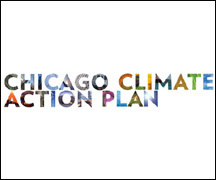
Chicago has worn many nicknames throughout its history including the Windy City, the Second City,and the City of the Big Shoulders. However, if Chi-Town successfully adopts the recommendations of a climate report co-authored by Jessica Hellmann, a University of Notre Dame biologist, it may well be known as America's Greenest City.
Following completion of the report from a 26-member Chicago Climate Task Force that included Hellmann, Mayor Richard Daley recently unveiled a plan to reduce the city's emission of carbon dioxide, a key greenhouse gas, by 25 percent from 1990 levels by 2020.
The report indicated that 70 percent of Chicago's greenhouse gas emissions are due to buildings. A key strategy outlined in the report, therefore, is to make home and commercial buildings more energy efficient. The report suggests an increased use of green roofs to achieve this end.
Daley also committed the city to additional investment in public transportation to help achieve the 25 percent reduction.
The task force recommended 13 steps that individuals can take to lower greenhouse transmissions, including reducing home heating temperature by three degrees and keeping cars tuned up and tires properly inflated. As an added bonus, the 13 steps will save individuals an estimated $800 dollars in energy costs each year.
Hellmann and Knute Nadelhoffer of the University of Michigan were lead authors on the portion of the climate report concerning the ecosystem. The section examined the likely affects of warming temperatures and changing precipitation on plant species, wildlife, invasive species, pests, and agricultural ecosystems across Chicago land. It considered species currently present in the area as well as species that are expected to move into the region as climate zones shift northward through this century.
The chapter provides a regional perspective on cutting-edge research that affects our entire country and globe, Hellmann said.And because the entire Great Lakes region looks to Chicago for leadership, we hope that this climate report will have a strong leadership influence on other communities facing energy challenges.
The full report can be viewed at www.chicagoclimateaction.org.
Hellmann, an assistant professor of biological sciences, joined the Notre Dame faculty in 2003. She studies the ways that local and regional climatic effects are altering species and ecosystems. Frequently, she uses butterflies and their grassland communities to understand the effects of climate change on nature. Because detailed climate study in every ecological system would be a daunting task, her current research compares two butterfly species in western North America with the goal of predicting differential climatic affects on species with differing ecologies and traits.
Contact: Jessica Hellmann, assistant professor of biological sciences, 574-631-7521, hellmann.3@nd.edu
Originally published by at news.nd.edu on October 02, 2008.